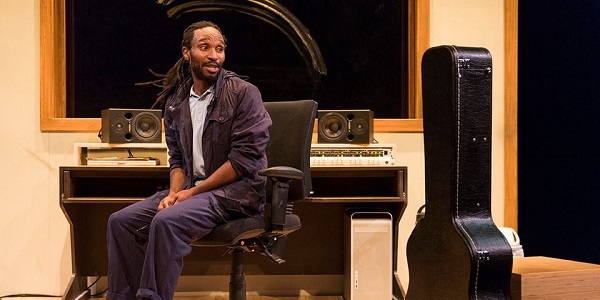| |||||||||
|
|||||||||
|
By:
Margaret Maina | |||||||||
| Posted:
Feb,14-2023 02:42:01
| |||||||||
|
The struggle with belonging and finding a sense of place as a migrant is something Mararo Wangai still navigates 16 years later.
Mararo had moved to Perth, Australia, on a student visa to study Media and Mass Communications at Murdoch University. However, his stay was unexpectedly extended following the birth of his son, with an Australian woman, opening a new chapter for him.
His career change into writing and performing was a journey in a new direction, where every performance since, has opened the door to a new collaboration or opportunity — including his work “Song in the Key of Trust”, a monologue performed at the Black Swan State Theatre Company of Western Australia’s 2020 season Unsung Heroes, and performing in Fremantle Theatre Company’s The Other Place with Kate Walsh, famous actor in the American medical TV series-Grey’s anatomy.
 Mararo Wangai (right) performs alongside Mahamudo Selimane, a renowned Perth-based Mozambican musician.
Mararo Wangai (right) performs alongside Mahamudo Selimane, a renowned Perth-based Mozambican musician.
Mararo 35, is a Kenyan-born Australian-based artiste, performer and writer, with an interest in diverse forms of storytelling. He holds a degree in Media and Mass Communication from the Murdoch University.
The artiste says that in his works he avoids simplistic narratives, assesses society critically and strives to remains adaptive, organic and alive through the creative works’ development and eventual encounter with an audience.
He grew up in Nakuru County where he attended multiple schools and completed his high school years at Greensteds International School. The school, Mararo said, focused greatly on instilling a sense of resilience and purpose in each of its students.
He played every sport available, joined as many clubs as he could and participated in as many extracurricular activities as possible. His parents wanted him to be a well-rounded individual and they never pushed him in any particular direction, but they always required that he take his studies seriously.
“Living in a part of the world where you are a minority is always difficult, add to that living in a country with a white supremacist history that nearly succeeded in a genocidal quest against Australia's first people, it makes one very conscious of your black skin,” he says.
Mararo thanks his lucky stars that he has never received any obvious targeted racism towards him although one has to deal with ignorance on a daily basis.
His first years in a foreign environ, he had to juggle studies with doing odd jobs to survive such as working night shifts at a cake factory, as a cashier in a clothes store, a dish washer in a restaurant and a bar attendant.
“Eventually I finished my degree in 2011 and moved to Melbourne for almost a year to work in marketing. We returned to Perth for the birth of our son which inspired me to return to my creative pursuits. Being a parent changed my perspective – it reminded me that of how finite our time on earth is and to use it wisely,” he says.
 Artistes Mararo Wangai and Mahamudo Selimane perform in Australia.
Artistes Mararo Wangai and Mahamudo Selimane perform in Australia.
When he eventually settled back in Perth, he concentrated on earning a living to look after his family, whilst pursuing writing and performing opportunities on the side.
“I did all sorts of jobs, from being a barista, courier driver, a courier dispatcher, a caravan cleaner, a forklift driver, until I got my first full-time paid acting job in 2016,’’ says Mararo.
He would work during the day, rehearse and perform at night, and connect with his family in the in-betweens.
This arrangement was tedious for him having already taken about two weeks’ unpaid leave to participate in writing developments in Sydney, which was shortlisted for an award at Sydney Theater Company. His employers were growing tired of his constant artistic commitments so he decided to resign when an independent theatre company called 'The Last Great Hunt' offered him a full-time role – one month of paid work.
The performance went well and led to a best supporting actor nomination which opened many doors for him.
“I am not a trained actor so for me every opportunity is a learning process; when I get the opportunity to work with incredible actors. Dr David Moody played a crucial role in my writing which I am able to fall back on when there is not much acting work, ‘’ he says , and adds that Dr Moody was his lecturer at Murdoch University and his love for African theatre was infectious.
Mararo adds that David challenged him not to stray too far from his roots. “It was a beautiful reminder that there is a universality in a good narrative regardless of its origins.
On creating Black Brass, a play commissioned by the Perth Festival, he says, “My hope is to challenge contemporary notions of resilience; that one must ‘overcome’ in a big or dramatic way. By reaching out to people on the fringes of society and bringing to light their narratives, I hope to create a work that speaks to the whole rather than the few.”
He hopes to continue creating work that is thought provoking, challenging and not afraid to sometimes punish an audience – not physically but emotionally and cognitively.
 Artistes Mahamudo Selimane and Mararo Wangai.
Artistes Mahamudo Selimane and Mararo Wangai.
“As a writer, I try not to be afraid of taking on heavy subjects and complex ideas. I challenge myself to find new ways of creating material that does not shy away from all that needs talking about in the world that we live in today,” he says.
As an actor Mararo says that he continues to learn as much as possible through performing, taking on roles that offer fresh challenges and lessons alike. He strives to build bridges through his writing and performance, and to create opportunities for more diversity in the industry.
“Art for me should be more than trying to entertain an audience. We live in a world full of distractions that I believe works to keep us placid and docile – there is so much that needs fixing in the world and every project that I take on, I hope chips away at breaking down misconceptions, encourages conversation on uncomfortable subjects or asks an audience to engage with a reality that is foreign to their own reality,” he adds.
“Australia, like Kenya, has a colonial history and legacy that must be unpacked and unpicked – my identity is crucial to the art that I create; it does not allow me to stay comfortable in the face of injustice or be complicit in the devastation of others.”
Mararo says he is not interested in recreating past art forms but rather in pushing his craft to find a new edge that asks new questions, one that challenges performers and audiences alike.
“The longer I am away from Kenya, the more foreign it becomes, and the longer I stay in Australia, the clearer the injustices become to me.
“This duality of realities shapes my art by sharpening it against complicity, docility and ignorance; If I am to stay silent on pertinent issues in Australia, I am giving a thumbs up to our complicity; if I am to cut away my ties to Kenya, I am failing my fellow citizens in not engaging with our realities and giving a thumbs up to docility,” he says.
His latest script, Black Brass, performed at the Perth Festival, offers an intimate journey between memory and reality, where the personal meets the political.
Mararo was the core artiste behind Black Brass and performed – as the cleaner of a music studio – alongside Mahamudo Selimane, a renowned Perth-based Mozambican musician.
Black Brass is set in a music studio over the course of a single night, where a cleaner's past is reawakened during a musician’s recording session.
Mararo is known to Western Australia audiences for his appearances in works by Black Swan Theatre (Unsung Heroes) and The Last Great Hunt (Improvement Club, Price Tag). But Black Brass, his first full-length performance piece, has been widely considered a sophisticated debut achievement.
“We have a huge amount of talent in Kenya and I want to play a part in offering opportunities to our artistes and nurturing their talents and ambitions,” Mararo says, adding that he would love to continue to explore ways to collaborate with Kenyan artistes by creating a development fund to promote upcoming artistes, or finding ways to build a bridge between the countries to get Kenyan artistes to Australia to present, or developing work whilst getting Australian artistes to do the same in Kenya.
“Diversity is not just about meeting the benchmark, but it is about removing the benchmark all together, [and] pushing for this value to be the standard across every sector,” he adds.
| |||||||||
|
Source:
Nation Media Group
| |||||||||
|
||||||||||||||||||||||||||||||||||||||||||||||||||||||||||||||||||||||||||||||||||||||||||||||||||||||||||||||
|
||||||||||||||||||||||||||||||||||||||||||||||||||||||||||||||||||||||||||||||||||||||||||||||||||||||||||||||


.jpg)




